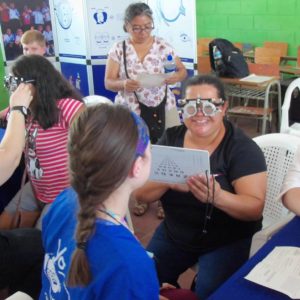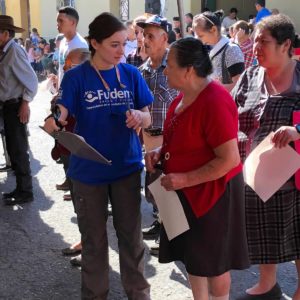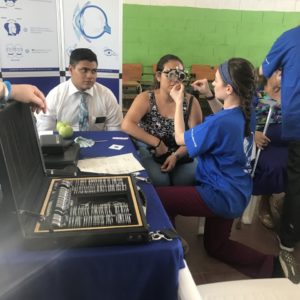Are you passionate about serving others? If so, then a mission trip is for you.
My name is Hannah Busroe and I want to share with you my experience this past year traveling to El Salvador on an optometric service trip. I went with my classmates at the Kentucky College of Optometry (KYCO) through the Student Volunteer Optometric Services to Humanity (SVOSH). If you are on the fence about committing to a service trip, I’d like to share a few of the many reasons to join the cause. I’ll also share information about fundraising, networking, exposure, and overall experience.
For many Americans, going to the optometrist can seem mundane. In countries with little access and limited affordability for eye exams, providing free services to a whole community is an eye-opening opportunity for all parties involved. Watching a patient’s eyes widen and the corners of their mouth turn into a bright smile because they can see the letters on a Snellen chart is a moment one cherishes forever, knowing your work has brought so much instantaneous joy and excitement to your patient. Even after exhaustion kicks in from working 8 to 12-hour days in a humid climate and the line of patients seems never-ending, nothing can dampen the excitement and emotion of patients who have received glasses for the first time in their lives.
There are two major categories to consider in your decision to join your school’s next service trip: personal advancements and professional advancements.
Personal Advancements
Attending a mission trip provides ample opportunities to develop your skills. Even as a first-year, there were plenty of ways to improve my skill set and confidence in things like patient communication and education, case history, entrance testing, subjective refraction, retinoscopy, and the use of trial lens kits and frames. Second-years were able to perform gonioscopy, dilation and much more. Just by having the chance to watch second-years  and doctors perform skills beyond my current education allowed me to learn and gain exposure to future clinical skills in my optometric education. After seven days and seeing more than 4000 patients, I established a comfortable workflow for myself and built confidence working with patients, from case history to writing a glasses prescription from my findings.
and doctors perform skills beyond my current education allowed me to learn and gain exposure to future clinical skills in my optometric education. After seven days and seeing more than 4000 patients, I established a comfortable workflow for myself and built confidence working with patients, from case history to writing a glasses prescription from my findings.
Since El Salvador is primarily a Spanish-speaking country, my communication with patients was in Spanish. It was a unique opportunity to get out of my comfort zone of working in non-ideal conditions to perform eye exams. This was challenging at the beginning, but by the end of the trip, my limited knowledge of Spanish had gotten better and I could conduct an exam from start to finish in a different language! This is a skill that will remain valuable even after the trip to communicate with Spanish speaking patients in practice.
Being outside and using basic, older equipment required me to be adaptable not only to my environment, but the diverse background of our patients. Most of the time we were working outside in public spaces where we could be easily accessible to our patients. This included schools, parking garages, and even an outside gymnasium. Fighting with the bright sunlight and heat was a challenge, especially for dilated patients. Despite this, the gratefulness for the services we provided far surpassed any challenges we  faced in the working environment. I am convinced that the experiences I had during this mission trip to El Salvador have better prepared me for the clinical skills I will perform in my second year of optometry school.
faced in the working environment. I am convinced that the experiences I had during this mission trip to El Salvador have better prepared me for the clinical skills I will perform in my second year of optometry school.
Professional Advancements
Marketing yourself and networking are essential, whether you are hunting for a job or looking to open your own practice after optometry school. The connections you make will help shape your future. Through my mission trip, I was able to build relationships with students from other optometry schools and doctors from states (and even countries) outside of my own and it was a great opportunity to develop friendships with optometry students in the classes above me. It is always beneficial to have someone you’re comfortable asking questions to, especially since the main purpose of a mission trip is to learn and grow through your service to others.
Prior to the trip, I contacted many local optometry practices to collect used glasses. This seemingly minor task was beneficial because I could introduce myself when picking up donations and these locations could serve as a potential clinical placement or a job opportunity.
The spirit of those we served was undeniably appreciative. I found that patients were often eager to allow multiple students to examine them and learn from their conditions. This made working on the trip a team-based approach, allowing everyone to work together and learn from all our patients. One patient we saw underwent Radial Keratectomy (RK) many years ago. Not counting his time waiting in line to be seen, he stayed at our clinic for almost 4 hours talking about his journey in El Salvador with eye doctors; he even allowed every student there to take a look at his RK scars.
Seeing such a large number of patients provided me with unique exposure to diseases, surgical procedures, and customs of a different country. Since El Salvador is so close to the equator, many patients have dense cataracts  develop at a much younger age with increased sun exposure. We saw a serious need for doctors to perform cataract surgeries and much of our patient education emphasized the importance of sunglasses. But even with the many volunteers, we still had to refer patients in need of any surgical procedures to a local office that was equipped to offer these services. Without the volunteers on the service trip, some of the patients’ conditions likely would have proceeded without medical attention, leading to a negative impact on the patients’ vision.
develop at a much younger age with increased sun exposure. We saw a serious need for doctors to perform cataract surgeries and much of our patient education emphasized the importance of sunglasses. But even with the many volunteers, we still had to refer patients in need of any surgical procedures to a local office that was equipped to offer these services. Without the volunteers on the service trip, some of the patients’ conditions likely would have proceeded without medical attention, leading to a negative impact on the patients’ vision.
Advice
It is important to become involved in whichever club oversees the planning of the trip, even if the group hasn’t finalized a location or if you haven’t personally committed. For me, this club was SVOSH. Throughout the year, our SVOSH chapter took part in fundraising opportunities to make the trip more affordable. Because of the demands of school, it is especially important to get an early start on raising money for your mission trip, which will create a smoother process for you to finalize important information such as trip fee deadlines and booking flights. With proper time management, you will be able to prioritize fundraiser involvement, school and other obligations to ensure your participation in the mission trip is at minimal cost and you can avoid unnecessary stress and chaos.
I left my mission trip with a grateful heart, friendships, exposure and experience that is incomparable to anything I had previously accomplished. I know finances are tight, loans and budgets are stressful, and time is limited. However, I promise that a service trip is an investment in your future and you will not regret it. I anxiously await the next mission trip I can participate in, and I hope that this article has convinced you to join the next opportunity that comes your way!

